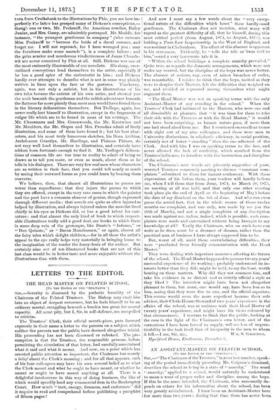LETTERS TO THE EDITOR.
THE HEAD MASTER ON FELSTED SCHOOL.
[TO THE EDITOR OF THE "SPECTATOR"]
Sin,—Severity is disarmed by the pathetic humility of the Chairman of the Felsted Trustees. The Bishop may exalt him into an object of deepest reverence, but he feels himself to be an ordinary mortal, struggling beneath a burden too great for mortal capacity. All must pity, but I, Sir, in self-defence, am compelled to criticise.
The Trustees' Clerk, their official mouth-piece, puts forward expressly in their name a letter to the parents on a subject which neither the parents nor the publie.have deemed altogether trivial. His proceeding has not been disowned or rebuked. The pre- sumption is that the Trustees, the responsible persons, before permitting the circulation of that letter, had carefully ascertained what it said and what it meant. And now, on a point which has arrested public attention as important, the Chairman has merely a belief about the Clerk's meaning ; and for all that appears, each of his four colleagues may have his own several belief as to what the Clerk meant and what he ought to have meant, or whether he meant or ought to have meant anything at all. There is a delightful incoherence in this way of doing business, the like of which would speedily land any commercial firm in the Bankruptcy Court. How much " tact, energy, firmness, and endurance" did it require to read and comprehend before publishing a pamphlet of fifteen pages ?
And now I must say a few words about the " very excep- tional nature of the difficulties which beset " these hardly-used gentlemen. The Chairman does not mention, what many will regard as the greatest difficulty of all, that he himself, during this
most critical period (from August, 1874, to August, 1875), was holding a Poor-Law Inspectorship in the West of England, and was resident in Cheltenham. The effect of this absence is apparent in his statement. Evidently, he " tells the tale as 'twas told to him,"—and a very ivaccurate tale it is.
"Within the school buildings a complete anarchy prevailed." Quite true, as regards the domestic arrangements, which were not under my control, but the discipline of the boys was never better.
The absence of serious, nay, even of minor breaches of order, was remarkable. I rejoice to think that the boys, incited as they were to despise their Masters, felt the difficulties that weighed on me, and avoided or repressed among themselves what might augment them.
"The Head Master was not on speaking terms with the only Assistant-Master of any standing in the school." When the Trustees' Clerk had intimated to the Masters, who were one and all dismissible at pleasure, that " it was time for them to take their side with the Trustees or with the head Master," it would not have been surprising, as human nature goes, if more than one had stood aloof from me. But I continued on excellent terms with eight out of my nine colleagues, and these were men in University distinctions, in scholastic efficiency, in social position, certainly not of lower " standing " than the one adherent of the Clerk. And with him I was on speaking terms to the last, and never allowed the lack of cordiality, which resulted from the Trustees'influence, to interfere with the instruction and discipline of the school.
The Chairman's next words are piteously suggestive of poor, worried Trustees constantly meeting to discuss "constant com- plaints " submitted to them for instant settlement. With these expressions of his before them, your readers will hardly believe me, when I tell them that from June, 1874, to March 20, 1875, no meeting at all was held, and that only one other meeting took place (in the end of April or the beginning of May) before the date of my dismissal on the 8th of June. And who can even guess the actual fact, that in the whole course of those twelve months one complaint, and one only, was made by me (on the 20th of March), and not a single complaint of any description was made against me, unless, indeed, which is possible, such com- plaints were made and entertained without being brought to my knowledge at all? Verily the Chairman, who on such facts can write as he does, must be a dreamer of dreams, rather than the practical man of business I have always supposed him to be.
But, worst of all, amid these overwhelming difficulties, they were "precluded from friendly communication with the Head Master."
They were dealing with important measures affecting the future of the school. The Head Master happened to possess twenty years' successful experience of its working ; probably understood its in- terests better than they did; might be held, to say the least, worth hearing on these matters. Why did they not summon him, and take his evidence in as distant and as strictly official a style as they liked ? The interview might have been not altogether pleasant to them, but must, one would say, have been less so to him, seeing that they were five to one, and the official superiors.
This course would seem the more expedient because their solo adviser, their Clerk-House-Steward of two years' experience in the affairs of the school, was at variance with their Head Master of twenty years' experience, and might have his views coloured by that circumstance. I venture to think that the public, looking at
the case in the light of the Chairman's own letter, and of the corrections I have been forced to supply. will see less of imprac- ticability in the task itself than of incapacity in the men to whom






































 Previous page
Previous page